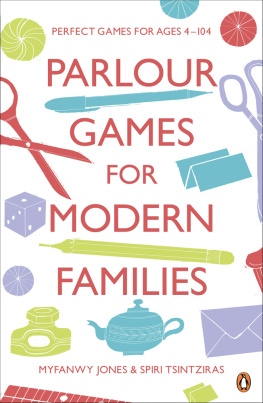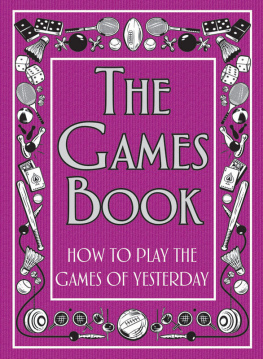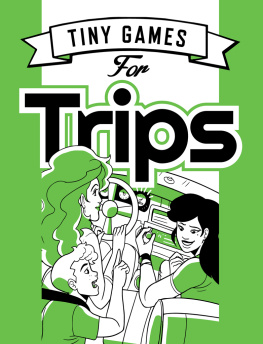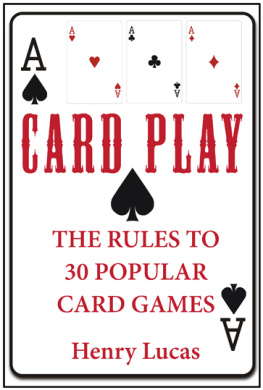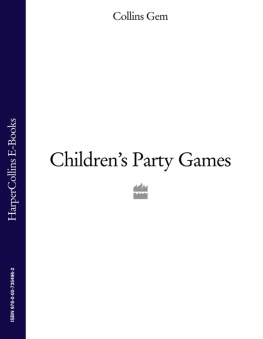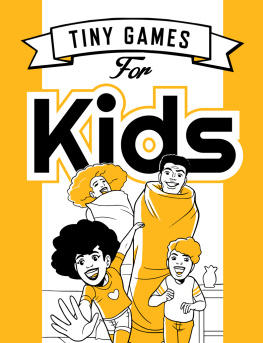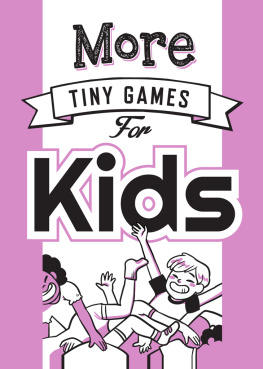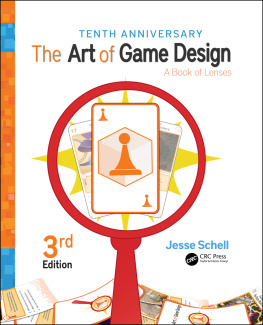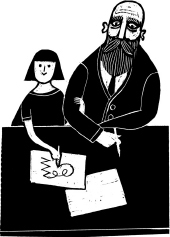PARLOUR GAMES FOR MODERN FAMILIES
MYFANWY JONES
& SPIRI TSINTZIRAS
PENGUIN BOOKS
THE BEGINNING
Let the conversation begin...
Follow the Penguin Twitter.com@penguinUKbooks
Keep up-to-date with all our stories YouTube.com/penguinbooks
Pin Penguin Books to your Pinterest
Like Penguin Books on Facebook.com/penguinbooks
Listen to Penguin at SoundCloud.com/penguin-books
Find out more about the author and
discover more stories like this at Penguin.co.uk
PENGUIN BOOKS
Published by the Penguin Group
Penguin Books Ltd, 80 Strand, London WC2R 0RL, England
Penguin Group (USA) Inc., 375 Hudson Street, New York, New York 10014, USA
Penguin Group (Canada), 90 Eglinton Avenue East, Suite 700, Toronto, Ontario, Canada M4P 2Y3
(a division of Pearson Penguin Canada Inc.)
Penguin Ireland, 25 St Stephens Green, Dublin 2, Ireland (a division of Penguin Books Ltd)
Penguin Group (Australia), 250 Camberwell Road, Camberwell, Victoria 3124, Australia
(a division of Pearson Australia Group Pty Ltd)
Penguin Books India Pvt Ltd, 11 Community Centre, Panchsheel Park, New Delhi 110 017, India
Penguin Group (NZ), 67 Apollo Drive, Rosedale, North Shore 0632, New Zealand
(a division of Pearson New Zealand Ltd)
Penguin Books (South Africa) (Pty) Ltd, 24 Sturdee Avenue, Rosebank, Johannesburg 2196, South Africa
Penguin Books Ltd, Registered Offices: 80 Strand, London WC2R 0RL, England
www.penguin.com
First published in Australia by Scribe Publications 2009
Published in Penguin Books 2010
Copyright Myfanwy Jones & Spiri Tsintziras, 2009
All rights reserved
The moral rights of the authors have been asserted
ISBN: 978-0-14-196302-0
PENGUIN BOOKS
PARLOUR GAMES FOR MODERN FAMILIES
Myfanwy Jones and Spiri Tsintziras were sitting in a Melbourne park one day, watching their children play, when they started reminiscing about the games from their own childhood and the idea for this book was born. With four children and twenty nephews and nieces between them to test all these games out, theyve spent a hilarious couple of years gathering the material and writing this book. In their time not spent playing games, both are writers. Myfanwys first novel The Rainy Season was shortlisted for the 2009 Melbourne Prize for Literature and her website is www.myfanwyjones.com
To Marlon, Dolores, Llewellyn, and Emmanuel
INTRODUCTION
THE CASE FOR GAMES
In the true man there is a child concealed who wants to play.
Friedrich Nietzsche
We were sitting in the park, two mothers, watching our children play and reminiscing about childhood games. Wink Murder, Consequences, Dictionary, Cheat we hadnt thought about these games in years. They were fantastic, we reminded one another. Our children would love them! And they didnt involve screens, or require a trip to Kmart. Why didnt we play more?
We noticed that even talking about games made us feel good, made us smile.
We managed to recall a handful of games, but decades of information overload of red wine and caffeine and deadlines and babies and odd socks and hastily scribbled lists and news updates and crashing computers and rushing and still being late meant that most had left the memory bank, or had disintegrated beyond recognition.
We needed a book to turn to, a record of all the games in solid print. And so it was that Parlour Games for Modern Families became a twinkle in our eyes, and then a publishing proposal and, finally, many games and a great many laughs later, here it is with all its fingers and toes. We wanted it for our own use, and figured there would be other families who would want it, too. This simple motive has guided us all the way through.
But what are parlour games, why do we think theyre so great, and what can you expect from this book?
THE GOLDEN AGE OF PARLOUR GAMES
A parlour is just a living room, and parlour games are group games played in said room. Easy. In historical terms, however, parlour games generally refer to those diversions enjoyed in British and American and, to a lesser extent, Australian parlours of the Victorian era. In the wake of the Industrial Revolution, well-to-do families had more leisure time than their predecessors, and this gave rise to a whole new generation of games involving wordplay, memory, logic, dramatic skills, and acts of absurd and pointless fun. These games were often played at small evening parties with family and friends; think Mansfield Park and the gay goings-on in the parlour after supper.
Most Victorian parlour games used equipment found in the home, and tended to be imaginative, resourceful, and overwhelmingly people-powered. While competitive, they were not particularly about winning and losing: they brought family and friends together for the uncomplicated purpose of enjoying one anothers company while having fun for funs sake. It was a great time to be a games lover.
A manual of Parlour Games has long been a desideratum among the social and family circles of town and country.
Catharine H. Waterman, The Book of Parlour Games, 1853
But along came radio, movies, and then television. People were naturally enthralled by the new technology and the entertainment that these media could deliver and that was before the marvel of computers. The popularity of the parlour game rapidly waned. Game of Flip the Kipper, anyone? Not while The Colgate Comedy Hour is on, and after that theres I Love Lucy. Pass me a devilled egg, would you?
Parlour games did, however, live on in popular culture. Some were relegated to childrens birthday parties, or to the annual family beach holiday: think Pin the Tail on the Donkey, Blind Mans Buff, Charades. Others appeared in the guise of radio and television game shows, such as Twenty Questions, Celebrity Squares, and Wheel of Fortune. The vast majority of board games on sale at your nearest department store are derived from parlour games: Balderdash, Pictionary, and Battleships, to name but a few. And many computer games have their origins here, too: Nintendo offers a variety of parlour games in its All-Time Classics series.
But, in the beginning, all of these games were played at home simply, for free, and to the great delight of their participants.
FUN UNPLUGGED
If parlour games died a natural death, why try to revive them? In our parlours, we watch our plasma flat-screen digital TV, and it delivers a perfect picture, crisper than ever before. You can even watch telly on your iPhone, if you are so inclined perhaps while sitting on the toilet. For something more interactive, theres the Xbox or Wii. As for the World Wide Web, well, you could spend the rest of your life surfing it and never get to the end of the wave.
What is so special, then, about a night of homemade Bingo or a round of Eat Poop You Cat? What kind of loopy Luddites are we?

